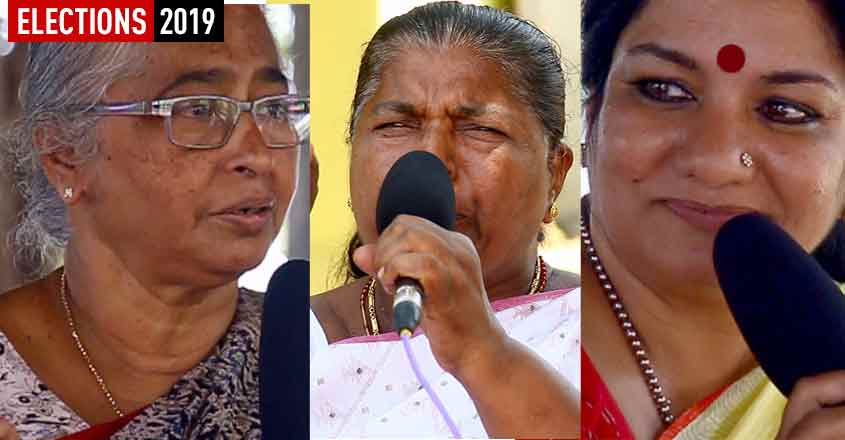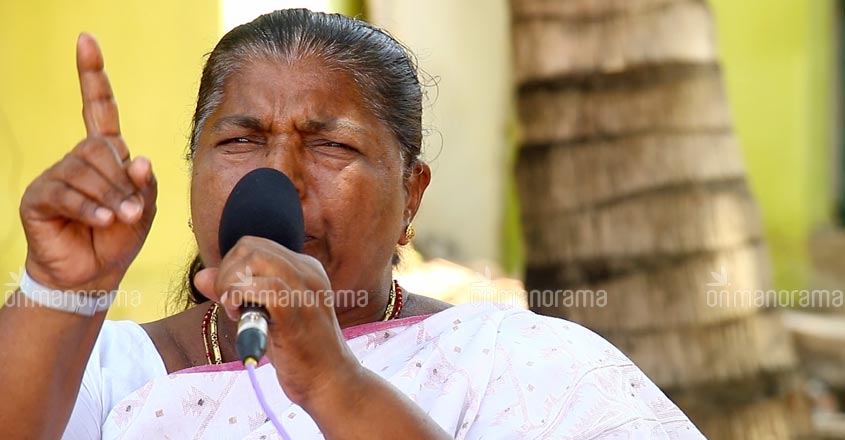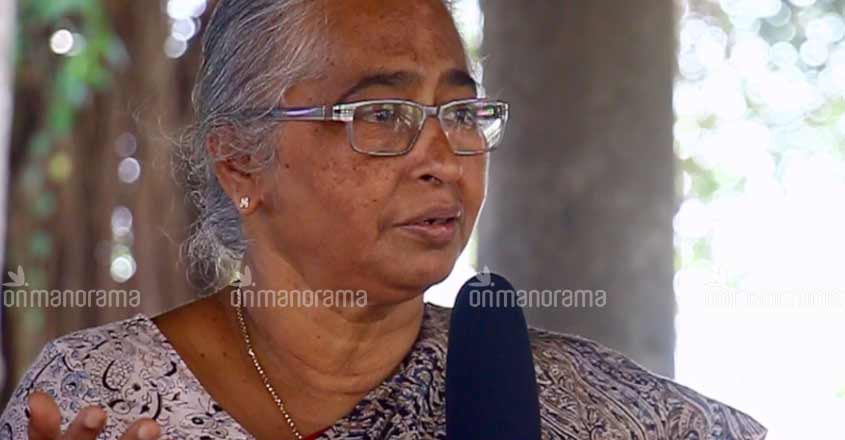
No election in Kerala has been as much about women as the 2019 Lok Sabha polls. Ever since the Supreme Court ordered last September that women of all ages could enter Sabarimala, Kerala politics has taken the course of the Pamba river, it has been flowing close to the hill shrine.
The Sabarimala issue is now larger than the mere entry of women into a space they were historically kept out of. It has pushed to the fore medieval faith-related taboos surrounding the woman's body. This has also inspired calls for a second Renaissance movement.
But surprisingly, women themselves have put out confusing signals. Some want these taboos, which they say are dehumanising, removed for good. But a seemingly equal number do not want such restrictions to be made part of the gender debate in a progressive state like Kerala?
The namajapa protests against the Supreme Court verdict saw massive female turnout. So too did the Renaissance Wall that was formed vertically across the state in support of the verdict. The woman's mind, therefore, and as always, remains mysterious.
On the eve of the 17th Lok Sabha polls, Onmanorama travelled the state meeting small groups of women to understand what Malayali women have in their mind when they go to vote. For fisherwomen, whose men had saved hundreds of lives during the August floods but are still an ignored lot, Sabarimala did not matter at all. Female activists, on the other hand, found it amusing that women themselves would claim that they were impure. Most women entrepreneurs we met in Kozhikode said the Sabarimala protests were nothing but a political ploy in the name of women.
The fisherwomen were especially dismissive of the agitation. “For someone who finds it hard to get three meals a day, Sabarimala is not an issue at all. It is with the cruel intention of securing some votes that certain parties have attempted to exploit the Sabarimala verdict,” said Madonna. “The issue was brought up just to serve some people in the elections,” said Mabel Raymond, another fisherfolk.

Fresca Kurishappan was angered by the protests because it had affected her business. “There were so many hartals called that we fisherwomen lost our business,” she said. Nonetheless, she was proud of the women who entered Sabarimala. “These women entered Sabarimala to pray, and not to shout zindabad,” Kurishappan said and added: “They were actually protesting against a custom that discriminated against women. In a democratic country like India both men and women have equal rights. If she has done nothing wrong, a woman can enter anywhere, anytime, just like any man.”
Aleyamma Vijayan, the founder of Sakhi, too echoed the fisherwomen's concerns. “The women were used by political parties. They had pre-planned it,” she said. Leading academic Meena T Pillai said the Sabarimala controversy would decide her vote this time. “Sabarimala is crucial to my vote. It is integral to the way I would be zeroing down on whom to vote and what kind of an ideology to support,” she said.
Author and historian Lekshmy Rajeev, too, said that a thinking and self-respecting woman would definitely remember Sabarimala when she heads to the polling booth. “I definitely will think of it,” she said.
According to Sakhi's Aleyamma Vijayan, the repercussions of the Sabarimala verdict had upturned all progressive notions about Kerala women. “So far we had said that all the social progressive indicators of Kerala were achieved because women had education and were forward in all respects when compared to women in other states. But Sabarimala showed that basically the mindset of majority women in Kerala were still in the feudal age,” she said.

Vijayan was especially appalled that women themselves had taken to the streets and claimed that they were impure. “It is such an unthinkable way for women to talk about themselves,” she said. Sonia George of Self-Employed Women's Association said that faith had actually confused women about their body.
“When they come and talk to us, they will take a progressive position. But at the same time religion will be forcing them to take another position,” Sonia said. She said when women were asked to consider menstruation as part of their body, as part of their reproductive rights, they seem half convinced. “In front of us they say okay but when they go to the temple or church they won't practice it,” she said.
Meena then asked whether women should vote for a party that says a woman's body was impure. Human rights lawyer J Sandhya said the Supreme Court verdict on Sabarimala clearly addressed the issue. “This is one of the very few judgments that speaks about gender justice in the country. It says that religion has no right to deprive women of their fundamental rights, not just Hindu women but also women of other communities,” Sandhya said.
Women entrepreneurs like Deepa Pavithran were troubled by the way the issue was politicised. “In Sabarimala, it was just a matter of faith, and it has nothing to do with gender equality. If the order was left as it is, such a controversy would not have erupted. This was just used as a political tool. There are other serious issues that women face in our society. This was politically motivated,” said Pavithran, the owner of Zain beauty studio chain.
There were concerns that women were being taken for a ride. Lekha Koroth, the owner of Anneka the Boutique, felt sorry for the women who came out in protest against the Supreme Court verdict. “This was part of a big political game, and the women who came out against the verdict looked as if they did not have a voice of their own, and also as if they came there at the prompting of some body else,” she said.
Silsila Kunhahammed, a hotelier based in Bengaluru and Kozhikode, said no public spaces should be barred for women, leave alone Sabarimala. “This is a land where more than half the population is women. Equality is a minimum requirement. Why just in Sabarimala, in all pubic places including playgrounds, women and girls should have equal access,” she said.
Deepa P M, the manging director of Eye Books, wanted women to do some introspection. “This verdict, and its aftermath, should make us introspect on the gains women have made as a result of the Renaissance movement of yore. Were women given adequate emphasis in these reform movements,” she asked.
Silsila, then, pointed out an irony. “All through the Sabarimala agitation, the women were at the forefront. But once the elections were announced, were have the women gone,” she said.


